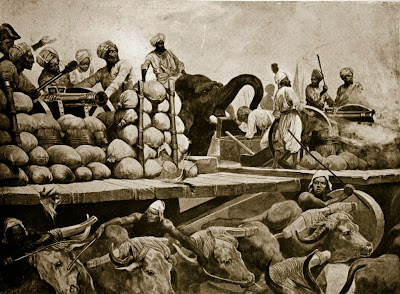 |
| Battle of Plassey1757. Bullocks & elephants cannons. wikipedia.com |
People of Indian
history are aware that the battle of Plassey of 1757 between the
Nawob of Bengal and the British forces commanded by Robert Clive was the very first decisive victory in the gradual growth of British imperialism in
India and abroad.
 |
| Battle of plassey, British artillery. oldindianarts.in |
Under
some pretexts, Clive, a clever military strategist locked horns with ruler Siraj, fought a bloody war,
dethroned him and at last had him killed by his own relatives who were greedy, grasping and jealous. Mir
Jafer, a close relative of Siraj, now a puppet in the hands of the cunning British, at last, realized his folly and grave mistake of betraying his own blood. He, now, turned against the
British who had a plan to gobble up the vast Indian subcontinent with revenue from Bengal. As
there were no hurdles in their path, it was a sort of open sesame for
the British traders.
For
the proud Indians who remained disunited, it was the beginning of a downhill journey and it
took nearly 200 years for them to drive the British out of India, - a Herculean and uphill task for our forefathers.
In
matter of wars, besides espionage, planning, military strategy, and proper
execution, maintenance of arms
and ammunition
is equally important. If the machines do not work, their heads will be rolling on the ground. It is something akin to
cops
going out on a beat with faulty six-shooters
suddenly
facing
a group of street-wise muggers on a partly deserted downtown
street.
On July 17, 1757 the British East India company with 3000 soldiers was pitted against the Nawab Siraj-ud-daulah's army with 5000 men backed by the French army. The Nawob's army fought well against the British army led by Robert Clive who kept changing his war plans to confuse the enemies. The war dragged on because of heavy rain and wet weather. On both sides artillery played a big role on the battlefield.
Anticipating rain and
wet conditions,
the
British
made their calculation right and
came
to the battle field
well prepared
to face any eventuality that might arise. When they knew that
the
weather
condition
was not good,
they had standby weapons and
protected their
war weaponry,
etc with tarpaulins
and other protecting gear against
the lashing rain
and high humidity.
On the other hand
the Nawob ,unfortunately, did not have protection or cover for his
weaponry,
gun
powder, etc. This slackened the rate of fire
of his otherwise good weapons.
Clive's men kept up continuous artillery fire
and the Nawob's army was in disarray.
In the aftermath of this war, the Nawob lost 500 men.
That,
Mir
Madan Khan, military chief who fought with skill and tactic, was
mortally wounded,
was a big blow for Siraj. The British
army's casualty was minimal.
Another
factor that went against Siraj was his own allies
who
betrayed
him at so crucial a time like this. Mir Jafer, his son and other
dissident Amirs did not fight on the battle field and
and indirectly sided
with the British till his assassination.
Like Brutus in the Shakespearean drama,
here
his blood relatives stabbed the helpless Nawob on his back.
The third factor was the British had been planning to wage a war against the Nawob for a few months and had enough time to do their home work. For Siraj, time constraint was a major problem.
Here Robert Clive played a crucial role with unmatched cunning and Machiavellian skill and that is the reason why commander Robert Clive stood apart from other army British leaders in the sub continent. When Clive had put all this strategies into action, he was right on the target like US Army's Tomahawk cruise missile.
Ref:
https://en.wikipedia.org/wiki/Battle_of_Plassey








.webp)
